Some of the world's biggest gaming storefronts still don't credit who made the game
Plus: Helldivers II's dramatic weekend and Hades II's surprise launch
If you’re shopping on the official online PlayStation store for the video game Rise of the Ronin, you can easily spot what platform it’s on, when it was released, its genre, and even its supported languages.
Plus, you can see who published it: Sony Interactive Entertainment.
That information is all listed, as it is for every other game, on Rise of the Ronin’s product page in the official PlayStation store.
Not listed: The team that made the game. That’s Team Ninja of Koei Tecmo.
The game’s store page does have a product summary that notes that it is from the makers of Nioh and Ninja Gaiden, but even that doesn’t name Team Ninja. The studio’s parent company is alluded to in a line about the game’s copyright, if you know to look there.
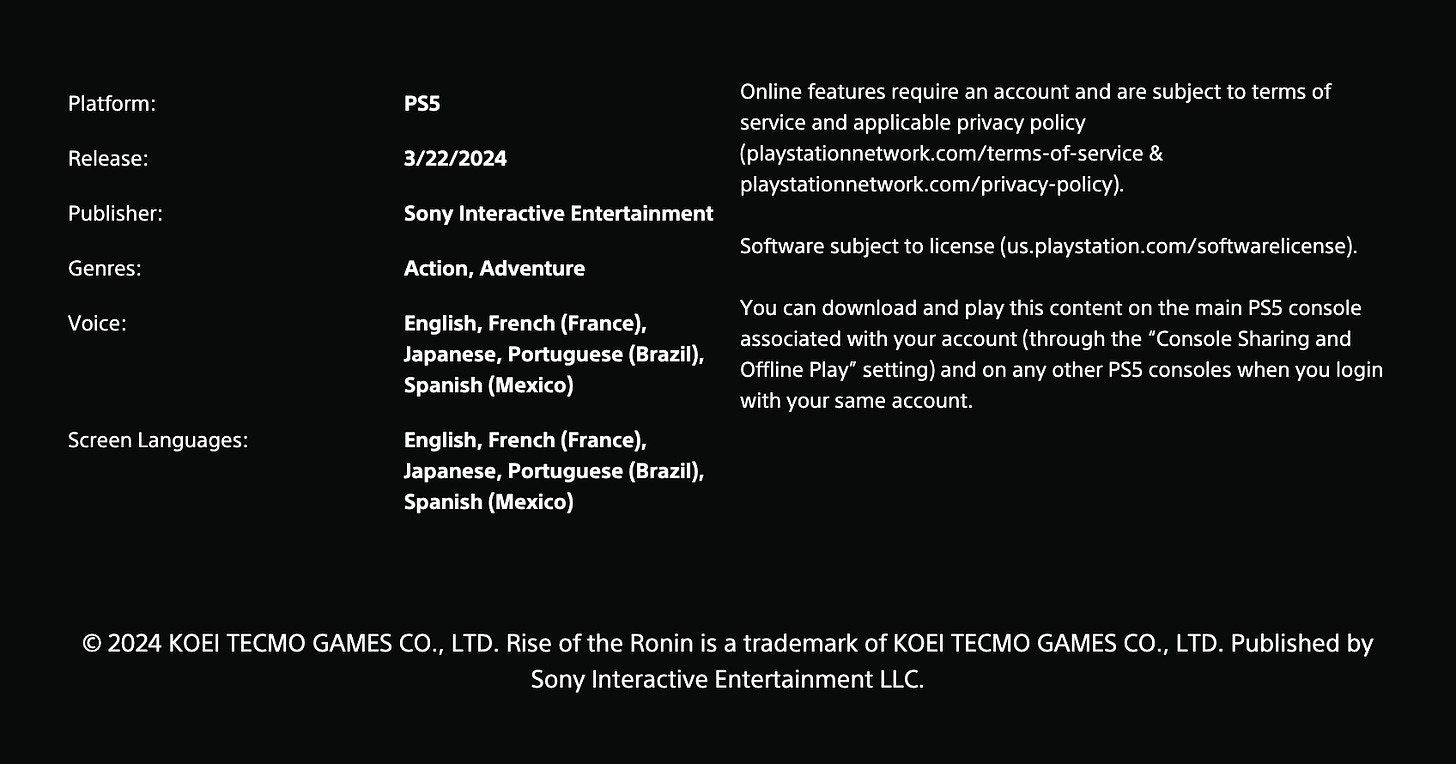
You’ll find similar opacity if you’re shopping for the newest Nintendo Switch exclusive, last week’s Endless Ocean Luminous.
As with all games in Nintendo’s eshop, the page for the new Endless Ocean lists the game’s publisher but not its developer. (If you know to look for it, a fine-print copyright line much lower on the page, citing Nintendo/ ARIKA, provides the hint of who made it).
Publishers are a key part of the industry and the financiers of many of the greatest games released every year. But they’re not the studios, who also play a key role in the greatest games of a given year by making them.
Nevertheless, for years, major online gaming storefronts have defaulted to identifying games with their platforms or publishers, often without providing any info about the people and teams who made them.
It’s the equivalent of an online bookstore omitting authors, or an online music service listing labels and not artists.
This article is part of an occasional series at Game File about the challenge of answering a fundamental question: Who made that video game?
Here’s a breakdown of how gaming’s biggest digital storefronts currently do (or don’t) credit development studios:
PlayStation Store (operated by Sony)
Developer listed? No
Publisher listed? Yes
Xbox store (operated by Microsoft)
Developer listed? Yes
Publisher listed? Yes
Nintendo eshop (operated by Nintendo)
Developer listed? No
Publisher listed? Yes
Steam (operated by Valve)
Developer listed? Yes. (And hyperlinked, letting users click and discover other games from the studio)
Publisher listed? Yes
Epic Games Store (operated by Epic Games)
Developer listed? Yes
Publisher listed? Yes
iOS App store (operated by Apple)
Developer listed? No*
Publisher listed? No*
* store lists “seller,” which is often the game’s publisher
Google Play Store (operated by Google)
Developer listed? No*
Publisher listed? No*
* store lists who the app is “offered by,” which is often the game’s publisher
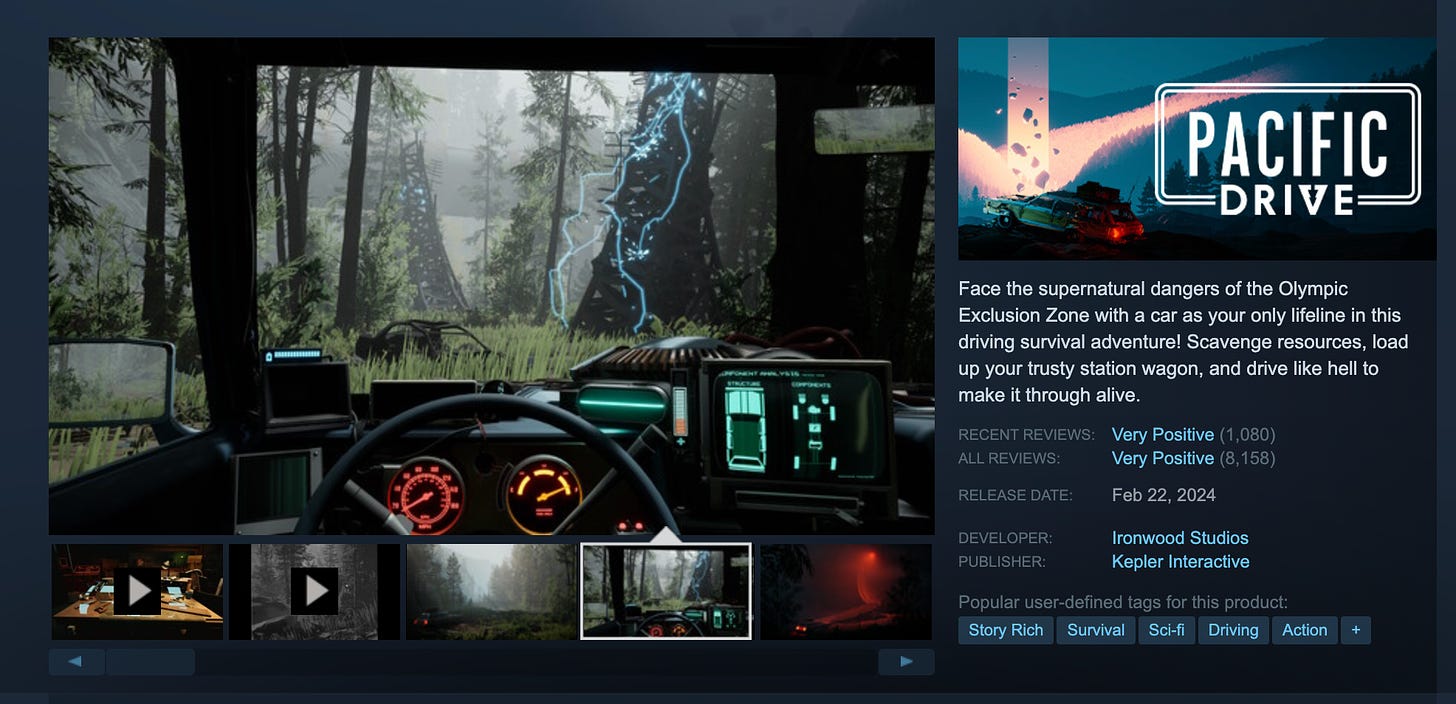
It’s unclear what has driven the inconsistency across the stores, whether it’s a mundane artifact of retail-centric data entry, a bias by big companies to promote an overall brand or something else.
Reps for the digital storefront owners, all contacted for this article by Game File, either declined to comment on the record or didn’t reply.
The impact of these selective listings on raising awareness of a development studio and its games is also unclear.
Occasionally, game listings in these big shops bear the marks of someone trying to work around the crediting limitations. The game It Takes Two, for example, is associated with publisher/distributor Electronic Arts in the PlayStation and Switch storefronts, but the game’s summary name-checks its acclaimed studio, the co-op specialists Hazelight.
An issue with few advocates
Digital storefronts are far from the only way a person might discover who made a game, but they are a key portal for discovering what to play and buy next.
The lack of consistent and prominent mentions of development studios in some of those shops is a “big concern” for developer Chandana Ekanayake, head of Thirsty Suitors dev studio Outerloop Games and 25-year industry veteran.
“Platforms need to have space to list both devs and publishers and not just one or the other,” he told Game File.
“While a publisher is often funding and supporting a developer's game, it's still the dev's game. A success or failure of a single game isn't typically going to affect the publisher's ability to continue but it certainly can affect the developer. More reason to have the dev's name attached to a title.”
But who would even push for such a change?
The Entertainment Software Association, the game industry’s leading trade group in the United States, is largely composed of members who are game publishers or platform holders.
The International Game Developers Association, which has a game credits task force, focuses on rampant, recurring issues of individual game makers not getting credits on the games they worked on.
“You don't hear companies saying they're annoyed for lack of credits, because they are usually in the game credits,” said Nazih Fares, head of localization at The 4 Winds Entertainment and vice chair of the IGDA’s game credits special interest group. “But their staff is a different story.”
“I believe it is an issue,” he told Game File. “We were just more focused on individuals that were omitted and got their chance to get a proper role in their careers delayed or ruined.”
And then there’s Amazon…
Given that some of the games industry biggest players don’t go out of their way to list developers when it is selling games, it might not be surprising that outsiders do no better.
Consider Amazon, one of the largest retailers in the world.
When it is sells music, Amazon names the song or album, then lists the artist (and links to their name so you can find more of their music).
When it sells a book, Amazon names the title, then lists the author (and links to their name so you can find more of their writing).
When it sells a movie, Amazon names it, then lists the stars and director (and links to their names so you can find more of their work).
When it sells a video game, Amazon names it, then lists…a publisher-specific digital store (and links to that). Unless the publisher mentions them in the fine-print product summary, there are no development studio names in sight.
Item 2: Sony blinks, drops controversial Helldivers II requirement
Sony announced on Monday morning that it would no longer update the publisher’s most popular new game of the year, Helldivers II, to require players on PC to sign in to its PlayStation Network to play it.
“We’re still learning what is best for PC players and your feedback has been invaluable,” the company said in a message posted on X/Twitter at midnight.
That appeared to defuse drama around the game that had left some players unsure how to continue playing, others ticked off at what felt like a bait-and-switch and its development studio publicly but politely demonstrating its displeasure with the now-abandoned mandate.
The PSN login requirement for the multiplayer sci-fi shooting game was announced prior to the PS5 and PC game’s February launch. But it had swiftly been suspended due to early server issues.
The requirement had largely been forgotten when Sony said on Thursday it would soon resume requiring a PSN log-in. Ticked off PC fans, some of whom had a legit gripe and some of whom just might have been overstating the inconvenience of an additional login layer, promptly thrashed the game with more than 200,000 negative user reviews.
Those words of frustration appeared to also bring some action. Helldivers II player counts on PC usually increase going into the weekend. They did not last weekend, a possible sign, beyond the rhetoric of negative user reviews, of players turning on the game.

While Sony had said last week that the PSN requirement would improve its ability to moderate bad player behavior, no one behind the game had a clear message for PC players who pointed out that some countries where people bought the game didn’t have access to PSN. (On Sunday the game was delisted from sale in 177 such countries, PC Gamer reported.)
Johan Pilestedt, CEO of Helldivers development studio Arrowhead, spent the weekend on social media offering his support for unhappy PC gamers and acknowledging publicly his difference of opinion with Sony regarding the PSN requirement. “We would have preferred it to be optional,” he wrote on Sunday.
On Monday, Pilestedt thanked Sony for the about-face.
Many annoyed players on Steam also did an about-face, flooding the game with nearly 200,000 new positive reviews. Helldivers II’s count of negative reviews dropped from 350,000 to 290,000 over the course of the day.
Pilestedt even suggested that something amusing could come from all of this. His developers are considering turning the visual of a streak of red negative user reviews for the game into a cape to wear in the game. “The team is [talking] about a good name for it right now,” he said.
Item 3: In brief…
🤔 The PC version of Sony-published PlayStation hit Ghost of Tsushima will require a PlayStation Network account for its multiplayer side mode but not for its solo campaign, per a timely social media post from the game’s official account.
😲 Nintendo fans are seeing who can stay connected to the company’s recently-shuttered online games the longest, Kotaku reports.
Item 4: Hades II arrives*
Hades II, the most-wishlisted game on Steam, launched into early access midday Monday, offering paying customers a polished but intentionally incomplete version of a game that plays similarly to its 2020 predecessor.
I’ve played the new Hades for about five hours. I’m once again enjoying development studio Supergiant’s mix of Greek mythology and heavily repeatable, room-by-room combat encounters—that become easier with each life-death cycle, as you slowly acquire better tools and powers for your hero.
The only catch is that Supergiant’s decision to make the first direct sequel in the studio’s history has resulted in a game that, so far, feels very similar to its predecessor.
It’s possible there’s a twist in the Early Access build that I’ve yet to see or one that will be offered with future additions to the game prior to its full release. My initial feeling, though, is that Hades II feels more redecorated than renovated, more refined than revolutionary. Given how incredible the first game was, that’s no dealbreaker.
In the first Hades, we played as Hades’ son Zagreus, bantering with beautiful, charismatic gods while gathering boons and power upgrades to engage in ever flashier combat.
In the second, we’re Hades’ daughter, Melinoë, bantering with beautiful, charismatic gods while gathering boons and power upgrades to engage in ever flashier combat.
There are early hints of some promising news systems, including the ability to plant seeds and harvest plants at Melinoë’s home base. A new set of ultra-powerful attacks offered by the moon goddess Selene require skillful on-the-fly planning. They can only be summoned during an encounter against a room full of enemies after players spend many of Melinoë’s magic points. That encourages the artful, abundant casting of some tricky spells to reach a point when you’ve spent enough magic to unleash the power of the moon.
Some supporting characters in the game make meta-jokes about Melinoë collecting lots of items and being given mere checklists of things to do by the Fates. I’m not sure what to make of those yet.
The first Hades’ early access release was integral to perfecting the game and building up a loyal audience. It’s less clear why Supergiant needs early access this time, but the studio says on the game’s Steam page that the process should help:
“We have been actively working on the game for more than three years already. For our Early Access launch, we wanted Hades II to be far enough along that as many players as possible could have a good experience right away, yet not far enough along that it's too late in development for us to act on the feedback we receive.”
Supergiant says it will add more areas and story to the game during its Early Access public development cycle, culminating in a full 1.0 release some time after the end of 2024.
Hades II is also slated for a release on consoles, but Supergiant has not said if an Early Access version will be offered on any of them.


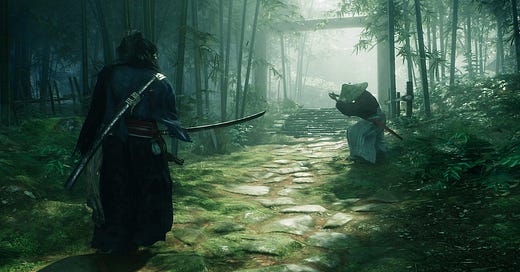



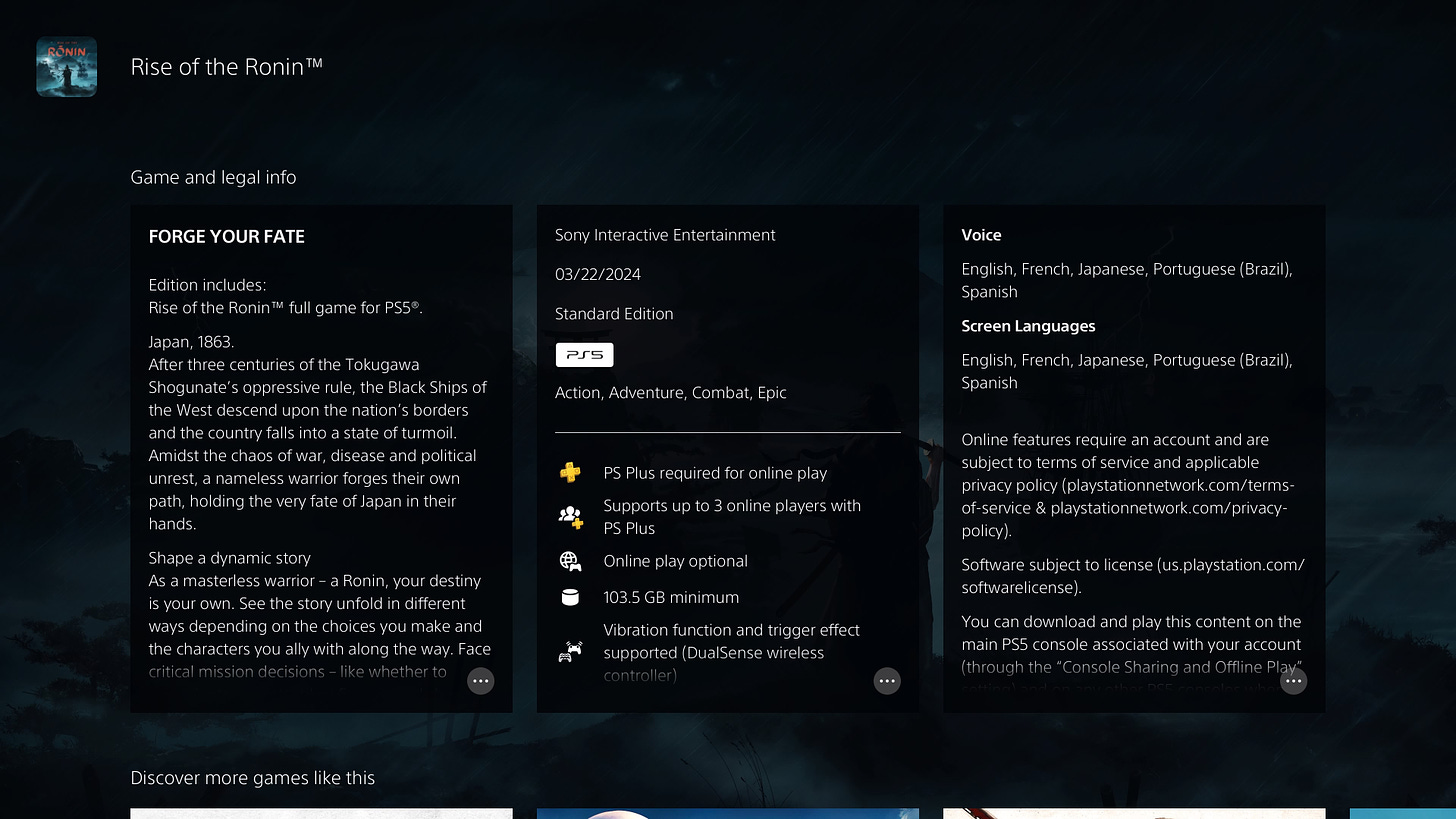
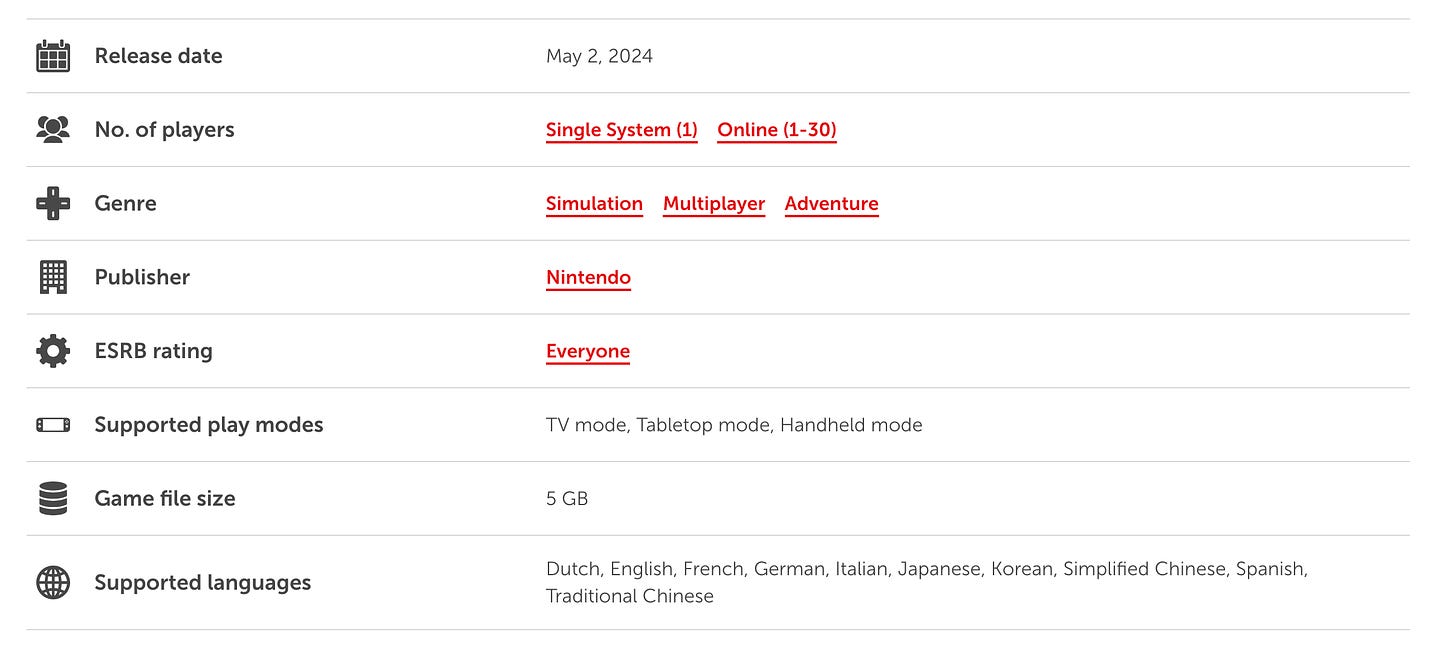

If Hades II comes out on Switch the same year as Balatro and Infinite Wealth, I will literally have to quit my job to keep up.
I'm not surprised that Xbox has made a converted effort to include developers. Their indie programs and outreach has been, at least to an outsider, far better than Sony or Nintendo's. Watching the various special events and reading anecdotes from the studios who worked with them in recent years, it seems like a deliberate effort was made to ensure that developers were given full credit and spotlighted. This could also be because of Microsoft's rampant consumption of studios while promising autonomy....but I am glad to see that they have at least done this step.